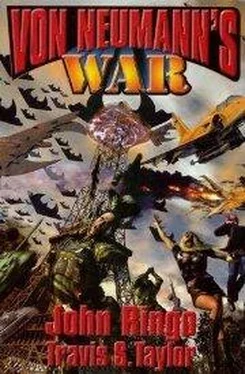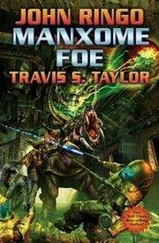“But I’ll say this for them, they just won’t give up. Roger has been in there almost twenty-four hours a day. I’m not even sure he has slept this week. He probably wouldn’t have eaten if his girlfriend, uh, what’s her name… Tami… you know the one with the huge knockers…”
“Traci?” Gries asked.
“Yeah, that’s it, Traci. Anyway, she has brought them food and occasionally makes Roger quit to take a shower or a nap or something,” Riggs grinned.
“Damn, Traci, huh? I had no idea.”
“Anyway, since Roger briefed us on France he’s been… different. Hell, we all have, but Roger… well, I think he thinks it’s his fault somehow.”
“France?” Gries asked.
“Nobody has briefed you?”
“Sir, we’ve been pretty much spinning our wheels since we returned. And like you said, Roger has been busy.”
“Shit. I’ll get somebody to brief you as soon as I can. Europe is… bad.”
Roger looked over his shoulder at the two observers and shrugged. Then he tapped Tom on the shoulder and waved to Alan.
The two soldiers met the engineers at the exit to the clean room and Danny raised an eyebrow.
“Not going well?” he asked neutrally.
“Not at all,” Roger admitted. They’d been studying the probes for a week and hadn’t been able to give one progress report. “We think we’ve found their motivator, the inertialess drive. But supplying power doesn’t get it to work. And we’ve found something that looks like the brain, but it’s a solid mass of silica and metal, mostly metal. And we’ve found what has to be their power source. But it’s…” Roger paused and rubbed his bloodshot eyes.
“Impossible,” Alan said, flatly. “F’n impossible! It’s a ball of hollow metal about the size of a baby’s fist. No fuel, no external supply. Just… a ball of metal.”
“And it’s got to, somehow, supply power equivalent to a multistage rocket,” Tom pointed out. “The runs from it shouldn’t even be able to handle the power. We know these things can accelerate at something like a hundred gravities. Even with their relatively low mass, we’re talking about terawatts of power and there’s no way that the power runs that we’re seeing could handle that load. And we’re still not sure what the tractor beam is generated by. Nothing in this thing makes sense.”
“The brain is the worst,” Roger said. “It’s unbelievably complicated. I mean you’d expect it to be, but this thing is light years beyond our current tech. I think it’s basically a controller chip, but it’s constructed in three dimensions. We’ve been trying to do that for decades but, besides the sheer difficulty and expense, the programming algorithms are a bitch. And the actual processing seems to be at the atomic level. We don’t have the instruments to study it, here, much less make head or tail of it.”
“What do you want to do?” Riggs asked.
“Give it to other people,” Roger replied definitely. “We’ve got three of the brain cases, if that’s what they are. We’ll send one to the redoubt at the LockMart facility in Denver, another to MIT, and the last one to Georgia Tech. Tech’s setting up a redoubt using some of our plans, so they could hold out even after Atlanta gets hit. Hopefully they can make some sense of it. I’m also going to request that all the data be turned into open source. We need anyone and everyone looking at this data. We don’t know who might have the right way to look at it.”
“That will need authorization,” Riggs pointed out.
“I’ll bring it up with the secretary, but I think I have that authority though I’m not sure,” Roger said. “But we need to make this information open to the public.”
“They’re going public with the fact that we sent a team into Greenland and it won a small battle with the probes,” the general said, nodding. “If we start putting out data about the probes it will be obvious where it came from. I’ll suggest making it a two parter. Do a dog and pony show with Shane and his team along with the bits of probes that we recovered. Civilian morale needs a shot in the arm; it’s getting really low.”
“I couldn’t believe the media when I got back,” Shane said, nodding. “It’s all doom and gloom.”
“There are plenty of people who have just given up,” Riggs admitted. “All of the media included.”
“Not that I particularly want to do a dog and pony,” Shane added. “But I think it will help.”
“I’ll call the Chairman,” Riggs said musingly, then chuckled. “You know, a few months ago I was surprised he knew my nickname. Now I’m calling him just about every day. Or, more often, he calls me. Strange.”
“Hell,” Roger said, trying to be humorous with his deepest accent, but his tiredness, fear, and somberness was hard to overcome. “Ah’s a deputy secretary with the weight of the world on my shoulders. How strange is that?” He said through a very thin, pursed lipped, halfhearted smile.
“As strange as getting invaded by metal probes from beyond the solar system?” Shane asked, shrugging.
Ret Ball: So my friends, if you are still on the Internet then you haven’t been overrun by the machines yet. If you happened to catch the news of the team that went to Greenland — that’s right Greenland, they’re getting awfully close to us now — then you know that the machines can be beaten by our military. I wonder though: Can we beat them in a full out attack? We’ve lost contact with China and Russia and all of Europe. Parts of Africa and India are out of contact and I’m hearing rumors from my friends in the South Pacific that Japan is under attack. What do we do, friends? I’m taking your calls and e-mails here tonight on the Truth Nationwide. Bart from Chicago, you’re on the air.
Caller: Hello, Ret. I served in the 801st for six years and I have to tell you that this is something we’ve never trained for. As far as I can tell we’ve lost all satellite communications and GPS. We’ve lost our capabilities to use radar and radio comms. And it looks like even flying is now out of the picture. When was the last time you saw a plane in the sky?
Ret Ball: That is a good point, Bart. I haven’t seen a plane for at least a week now. What do you make of it?
Caller: My guess is that the Chinese and the Russians put up a good fight and tipped the machines off to human military technologies and tactics. If those things can take out our sats then why not our planes? I bet they’re doing to us just what we did to Saddam in the Gulf Wars and putting the planet under a no-fly zone.
Ret Ball: Oh my gosh! I never thought of that. I bet you are right, caller. Thanks for the call. Aha, Megiddo is on line three! Hello, Megiddo you are on the Truth Nationwide. Tell us what you know.
Caller: Hi, Ret. My wife and I have taken to underground literally and I suggest that we all do this. I’ve been thinking about the Von Neumann probes’ mode of attack.
Ret Ball: Yes, do tell.
Caller: Well, they’re attacking the cities and the industrialized complexes. But they aren’t doing this because they’re militarily significant.
Ret Ball: Oh? Then why?
Caller: Materials. It’s plain and simple. The alien machines must need raw materials to replicate themselves. And what better place to find a lot of already refined materials than in the big modern cities? Think about how much metal is in one office building alone. The thoughts of that are staggering because it must have taken them several years to transform the Martian surface. And then it took them more than a year to transform the Moon. But not Earth. We have so many materials available and ready for them that they probably can’t eat it fast enough. That is probably the only thing slowing them down!
Читать дальше












